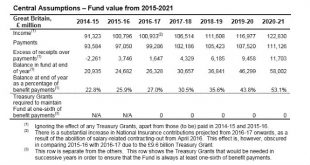Readers of this blog may know that Patrick Allen, founder of the Progressive Economy Forum (PEF) invited me to become a member of its distinguished Council in July this year. Other members include Professors John Weeks, Joseph Stiglitz, Stephany Griffiths-Jones, Robert Skidelsky, Daniela Gabor, Danny Darling, Ha Joon Chang and Doctors Johnna Montgomery, Geoff Tily, Will Hutton and Guy Standing. I am now supporting the work of the Council, and periodically writing for the Forum. The...
Read More »OBR accused of damaging UK economy with productivity data
The following was published by David Thorpe on the FT’s Adviser blog, and can be found here: https://www.ftadviser.com/investments/2017/11/30/obr-accused-of-damaging-uk-economy-with-productivity-data/ The Office for Budget Responsibility (OBR) and others including the government are wrongly focusing on the UK’s weak productivity growth in a way that is harming the future economic prospects of the country, according to Ann Pettifor, director of Prime Economics. Ms Pettifor was before...
Read More »Baltimore School Test Scores and Baltimore School Spending
I’ve noted before I have a bit of an interest in Baltimore because my wife originates from there (despite having convinced herself that she’s from the Los Angeles area). So I noticed this story: An alarming discovery coming out of City Schools. Project Baltimore analyzed 2017 state testing data and found one-third of High Schools in Baltimore, last year, had zero students proficient in math. Contrast that with this: The Baltimore City Public School System...
Read More »Calculus for journalists
“What do they teach them at these schools?” wondered the Professor in C.S. Lewis's The Lion, the Witch and the Wardrobe. The Professor, of course, was concerned about logic. But I wonder too - not about logic, but about maths. Especially among journalists writing about life expectancy and other long-term trends.Here is the FT proclaiming "Average life expectancy falls". This is the headline for a chirpy piece about how reduced life expectancy could make things easier for pension funds...
Read More »Money and the Government: Everything You Need to Know But Were Afraid to Ask
Pettifor’s new book, The Production of Money: How to Break the Power of Bankers, aims to elucidate the nature of money, the better to help women advocate for their needs. Money, credit, interest rates, bank regulations, the way things are accounted for in the public budget; all of these, Pettifor argues, have tangible effects on women’s lives, and the condition of society as a whole. And in order to make change, we’ve got to get passionate about topics that most of us have been conditioned...
Read More »Dangerous assumptions and dodgy maths
The last published accounts for the NI Fund show that, contrary to popular mythology, it does not have an enormous surplus. In fact it is currently running a deficit, as it has been for the last five years. Its reserves have fallen to the point where the Government was forced to top them up to prevent them falling below the statutory minimum of 1/6 of payments out of the fund. So I was somewhat surprised to read written evidence to the Work and Pensions Select Committee which appeared to...
Read More »The Fund that isn’t a fund
There is a great deal of confusion over National Insurance - what it is, how it works and what it funds. I have attempted to clear up some of the muddle elsewhere. But partly, it stems from the existence of something called the NI Fund. If there is a Fund, surely this implies that National Insurance contributions are invested? If so, those (like me) who insist that state pensions are unfunded are talking gibberish.There is indeed a NI Fund. But it is badly named. It would be more accurate to...
Read More »Those elusive welfare spending cuts
The Chancellor's Autumn Statement contained an apparent U-turn on the cuts to tax credits outlined in the July budget. Predictably, this was presented as the Chancellor "listening" to those concerned about the impact of sudden large falls in income for working families at the bottom end of the income spectrum. The Conservatives continue to position themselves as the party for "hard-working families".However, this isn't quite what it seems. The income cuts for low-income working families are...
Read More »Did Osborne Pause Austerity in 2013?
No, says The Times' David Smith. He says that the notion that there was a pause in austerity is an "austerity myth".He points to this chart from the Office for Budget Responsibility that shows fiscal consolidation as a percentage of GDP (relative to the 2008 Budget) continuing on throughout 2013 and 2014 and 2015:But the OBR's chart doesn't actually show what I would define as austerity. It shows the size of the government budget as a percentage of GDP relative to...
Read More » Heterodox
Heterodox




